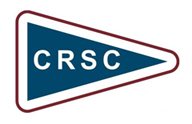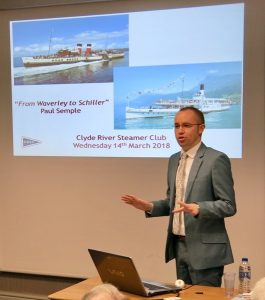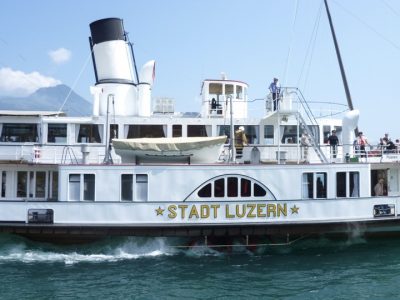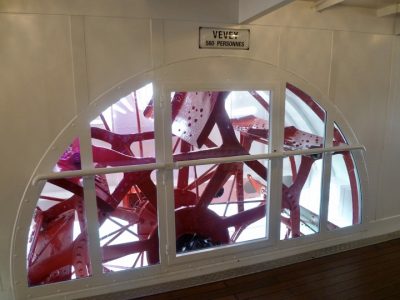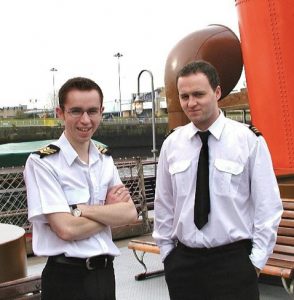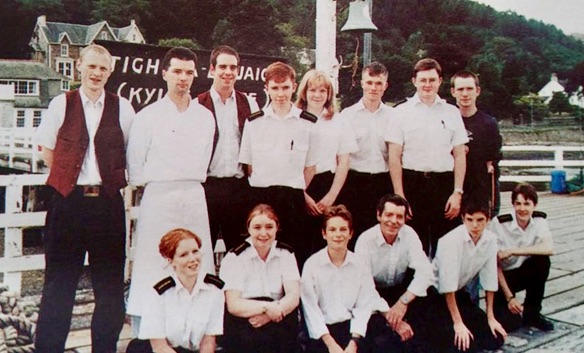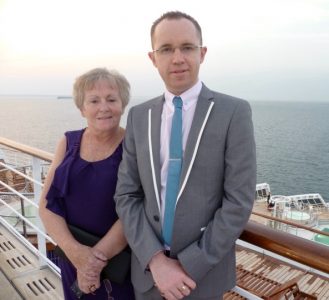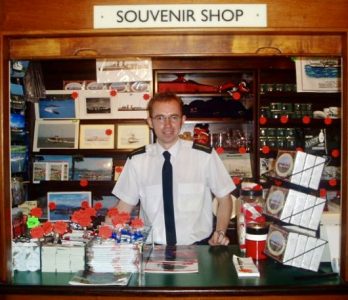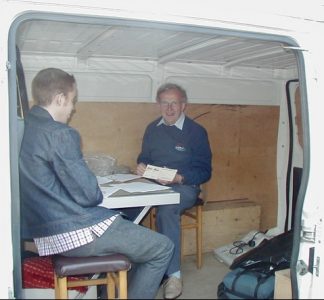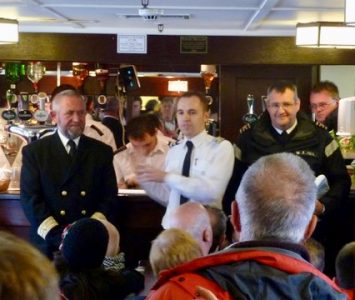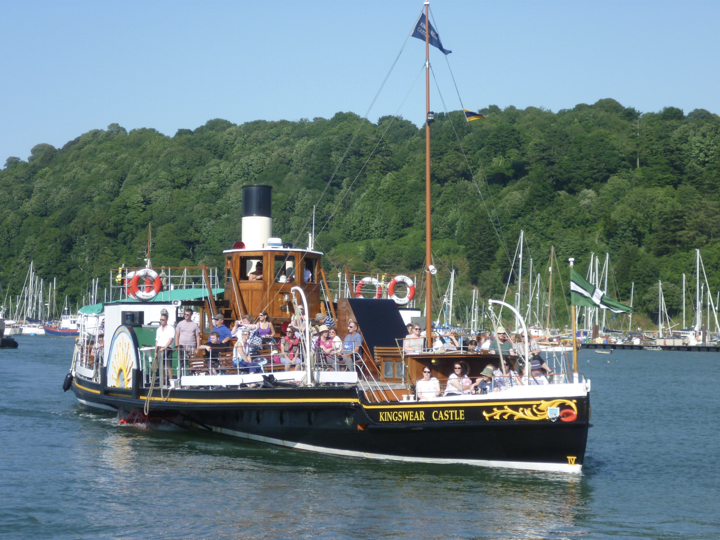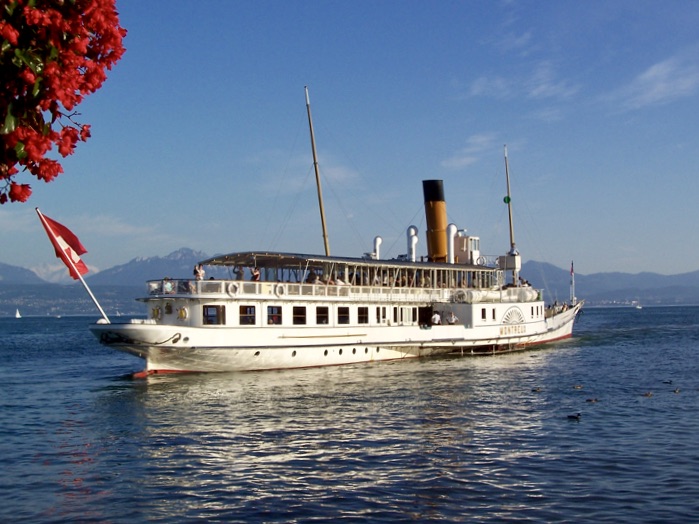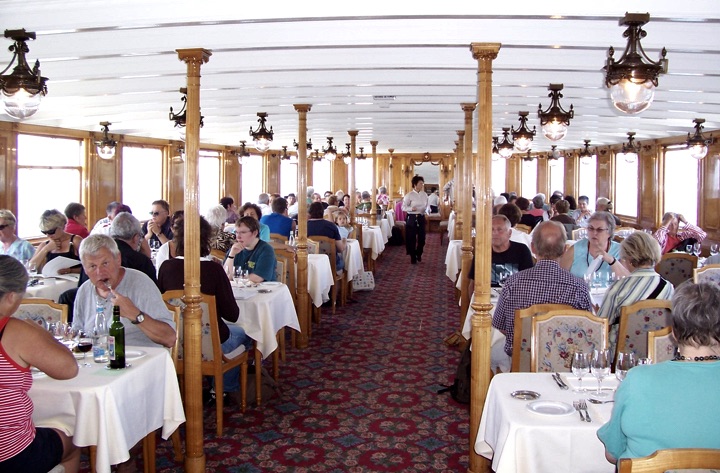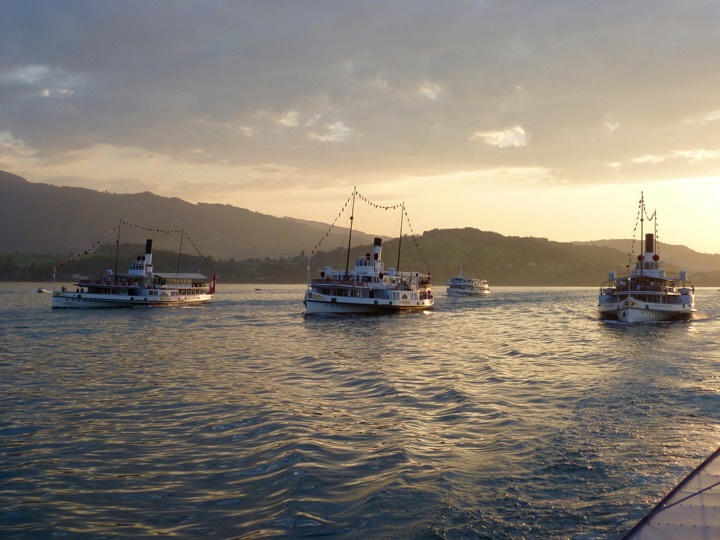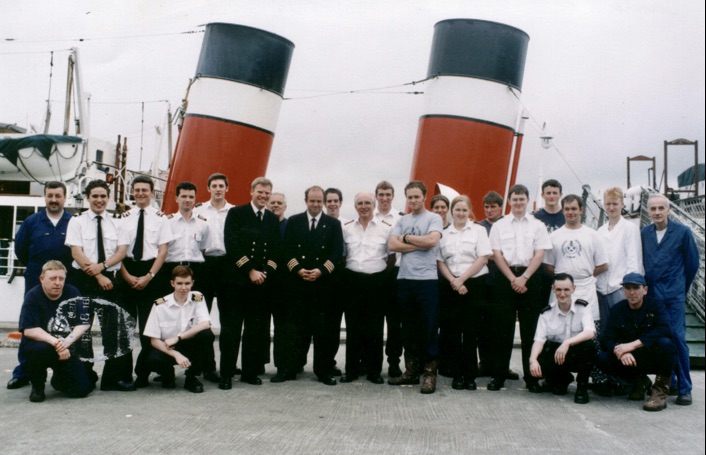
Waverley and her crew in 1998, with Captain Graeme Gellatly in the centre and Paul Semple crouching in white shirt on the left. Copyright Paul Semple
At CRSC’s March meeting the spotlight fell on two individuals — Paul Semple, National Chairman of the Paddle Steamer Preservation Society, who was the evening’s main speaker, and Douglas McGowan, who accepted CRSC’s award of Honorary Membership on behalf of himself and Terry Sylvester. Below Robin Copland’s report of Paul’s talk, we print the citation for Douglas and Terry given by CRSC President Iain Morgan, as well as the message which Douglas read out from Terry, who at short notice was prevented from travelling to Glasgow.
You see, here’s the thing. Paul Semple is a ‘people person’. It is perhaps an over-used phrase, but it does capture the essence of Paul’s talk at Jurys Inn, Glasgow, on 14 March 2018. The title was ‘From Waverley to Schiller’, but the underlying theme was the effect that much-loved ships have on those who come into contact with them. It really was a marvellous talk, carrying on the CRSC tradition of giving interesting and entertaining people a stage to share their experiences with Club members.
Paul took us through his experience and love of Waverley from his days as a wee lad back in 1984. He shared some of Terry Sylvester’s early marketing literature with us, including the memorable phrase ‘the stench of petrol and diesel fumes’! We were even regaled with a recording of the song ‘Save the Waverley’, which your reporter can confirm is still the same assault on the ear as it was 30-odd years ago. Paul captured the atmosphere of those far-off days by sharing onboard photographs of him with his mother and grandmother. Innocent times, but difficult times as well, as a dedicated group of volunteers strived to maintain the ship as the last exemplar of its type in Britain.
What drew him to Waverley? Well, apart from her obvious attraction as ‘The World’s Last Ocean-Going Paddle Steamer’ and the fact that she had her own song, there was the additional bonus that the ship had her own newspaper, in which one year, he read a headline, ‘Do you fancy a summer at sea?’ After an interview with David Duncanson, the die was cast. He found himself working 85 hours a week but gradually, under the gentle tutelage of characters like Craig Peacock and John Gilligan in the catering department, or Jim McFadzean and David Edwards in the Purser’s Office, the young Paul gradually came to love working onboard the paddler.
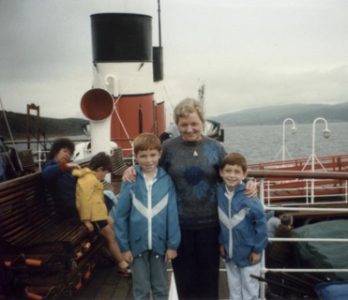
Childhood impressions: Paul (left) on board Waverley in 1987, with his Gran and younger brother Scott, during a trip from Ayr to Tighnabruaich. Copyright Paul Semple
His discharge book tells a story of following both Balmoral and Waverley round the coast of Britain. One minute, it was Waverley on the Clyde and the next, it was joining Balmoral on the Bristol Channel for three or four days; then back to the Clyde to rejoin Waverley. All the time meeting and working with people – different people. Some related; some in relationships that led eventually to marriage; some who became friends for life and many who introduced each other to different facets of their interesting lives. Parties ashore; parties onboard and the occasional light run between two ports not normally connected by a regular service. Avonmouth to Tobermory anyone?
“Waverley is about People” said Paul at one point, and his talk illustrated and exemplified that to the full.
He told the story, the poignant story, of the man at Ayr who arrived somewhat late and a little flustered for a coach run to join Waverley at Largs. He was in an electric wheelchair and was on oxygen, and initially there was doubt whether or not the chair could be accommodated on the bus. “No problem” said the driver and sure enough, they were able to accommodate him.
The man had a great day. He sat in the forward shelter and watched the Clyde go by – fortified by the occasional cup of tea brought by Paul. At the end of the day, the state of the tide allowed the crew to get him and chair ashore and Paul said in parting, “Hope you enjoyed your day and we’ll see you next year.” “Oh no,” said the man. “That will be my last cruise on Waverley. That was why I was so determined to get onboard today.”
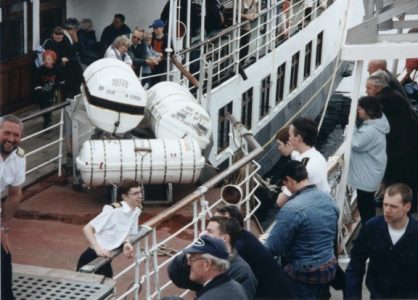
Paul (leaning over the railings) and Jim McFadzean (far left) on 16 May 1999, when Balmoral berthed alongside Waverley at Millport. Copyright Paul Semple
And then there was Flora. Flora would go round the passengers checking that everyone was enjoying their day. Come wind or rain and she would be out there spreading the word. To this day, Paul is not sure if she paid for anything, but she was worth her weight in PR gold, so there was no issue as far as that was concerned. Then she went missing and the news filtered through that she had passed away. Jim McFadzean went to her funeral where he learnt that she was buried in a Waverley jersey.
Talking of Jim McFadzean, Paul told the story of chatting with him one evening after the last passenger had left the ship and suddenly realising what made Jim want to come back every year. For the passenger, Jim was the first and last person that they saw. He was ‘Mr Waverley’. All the good feelings that people had for the ship; all the thanks they wanted to express – he was the recipient. The passengers made it all worthwhile for him.
“Waverley is about People”, right enough.
In a short interlude between Waverley and the Swiss paddlers, Paul told us briefly about his relatively recent introduction to cruising on ocean liners and cruise ships – an introduction by a friend called Keith Abraham. Where did he meet Keith? Need you ask! We were shown some marvellous interior as well as exterior shots of ships like Queen Mary 2, Oceania, Queen Elizabeth, Queen Victoria and P&O’s latest UK-market ship, Britannia. He was enthused by Cunard’s nod to history in the décor of their ships, the naming of some of the internal public rooms and the paintings and prints that graced their menu cards and internal marketing material.
Then it was back to paddle steamers with a homage to Kingswear Castle, the last coal-fired paddle steamer in the UK and now of course serving on the River Dart, based at Dartmouth. He enthused about the work being done to maintain her standards, both interior and external and showed us some marvellous pictures of her back on the river for which she was originally built in 1924. This was all a precursor for the last part of his talk – his love of the Swiss lake paddle steamers. He introduced us to the subject in an innovative way. When was the last time that a presenter handed round a packet of Toblerone for members to enjoy as he continued with his talk? As Paul put it on the night, it was like the cinema with all the sweety paper rustlings in the dark!
We were taken on a tour of the Swiss lakes through the eyes of a paddle steamer enthusiast – nothing less and nothing more. For most of us it was an education as our speaker shared picture after picture of white-hulled, early 20th century paddle steamers, the youngest of which, Stadt Luzern, was built in 1928.
Their interiors, most of them recently refurbished to a standard that suggested a wealthy clientele with pockets deep enough to enjoy the finer things in life, were breathtaking in their detail. Imagine wood carvings on walls and doors; painted deckheads above; wooden and elaborately decorated chairs sitting around white-tableclothed tables; cutlery set as for a royal banquet. And talking of food, we saw pictures of cuisine that would grace the table in any Michelin-starred restaurant.
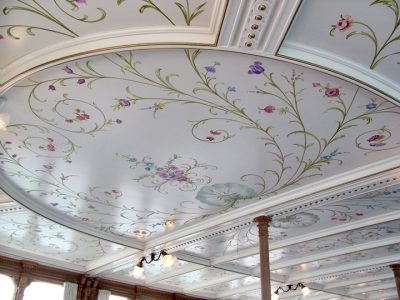
Ceiling panel of the Lake Lucerne paddler Uri, after renovation in the early 1990s. Copyright Paul Semple
We were shown pictures of engines, steam-driven engines in many cases, that were so clean that they would put many a kitchen to shame. Occasionally, Paul would take a well-earned breather and show us a video – interior or exterior, it didn’t really matter. We were enthralled.
We saw ships on Lakes Geneva, Zurich and Lucerne amongst others. We saw glass decks looking down onto moving engines; we even stared through a plate glass window at a paddle wheel spinning the ship along. We saw masts that collapsed; funnels that retracted into themselves and ventilators that slowly slid to the deck like the man who has just had that one too many – all to let their ship pass under a low bridge.
We saw a timetable that demonstrated that you could sail on Lake Lucerne paddlers from 9.12am all the way through to 9.47pm. We heard of trips planned to ‘bag’ as many steamers in one day as possible – his record is five, by the way!
Paul’s favourite ship in Switzerland? He admitted to a particular fondness for Schiller of 1906. After her recent refurbishment, he reminisced about a trip round the ship in the company of Douglas McGowan. Could they find fault? Apparently, there was one window pane where a small bit of putty had not been painted. Everything else? Perfection.Even the wee ‘nudge’ caused by the two cylinders and so reminiscent of Maid of the Loch, for example – even that somehow just added to the experience.
Our tour of Switzerland finished, fittingly accompanied by the Wilhelm Tell Overture, with a look at the statically-preserved restaurant ship, Wilhelm Tell. Paul told of the group of steamer enthusiasts that had helped secure her preservation. Furthermore, they had persuaded the Swiss authorities to designate all the Swiss paddle steamers as historic monuments of national importance.
Which led us back to the west coast of Scotland. Waverley, on a PSPS charter in 2013, was pictured at Largs pier where 800 passengers stepped aboard on a summer’s evening that was as near as Paul had ever got to a Swiss cruise in Scotland. He spoke warmly about our ship and disclosed that PSPS had contributed £2.76m since 1991. Apart from the money contributed by the Heritage Lottery Fund, this places PSPS comfortably as the lead contributor of funds. In addition, he reported that the society had contributed £50,000 to the Maid of the Loch appeal which would help towards the ‘Maid’ sailing again on Loch Lomond as early as 2019 if all goes according to plan.
A marvellous talk then and told in an engaging way. As Billy Tomlinson said in his vote of thanks, many people present will have had their appetites whetted for a visit to Switzerland, as well, of course, as for a number of sailings on Waverley this summer. The applause rang long and loud.
Click here for Paddle Steamer Preservation Society
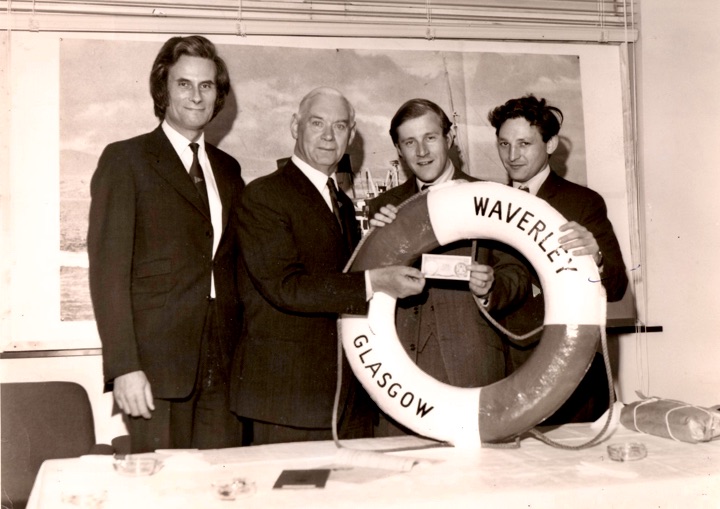
Paddler for a pound: the 1974 handover of Waverley, with John Whittle and Colonel Patrick Thomas representing the Scottish Transport Group, and Douglas McGowan and Terry Sylvester accepting the ship on behalf of the Paddle Steamer Preservation Society
With Douglas McGowan standing beside him, CRSC President Iain Morgan opened the March meeting by reading the following citation on behalf of the Club:
Ladies and Gentlemen,
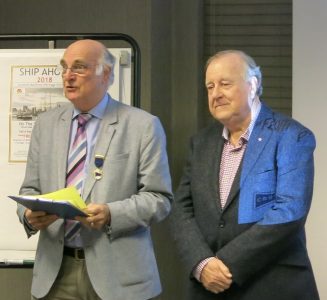
Iain Morgan reads the citation to Douglas McGowan at the start of the meeting on 14 March 2018. Copyright CRSC
We are delighted to honour tonight two individuals who have made a lasting contribution to Clyde steamer history — Terry Sylvester and Douglas McGowan. And in the best traditions of this type of ceremony, “Unfortunately one of them is unable to attend”! Due to the recent bad weather causing business disruption, Terry is unable to be with us.
Many of you will recall the Clyde in the 1960s. It was a time when you could sail everywhere and anywhere on the Firth, a time when season tickets opened the door to a steamer-hopping paradise, with any number of ships and any number of piers. My own early recollections were of seven steamers, not motor vessels or car ferries: the two ‘Duchesses’, Queen Mary II, Talisman, Caledonia, Jeanie Deans and of course Waverley.
At the time it felt as if this embarrassment of riches would be ours for life. But at the end of the 1964 season, we lost the ‘Montrose’ and Jeanie Deans, and then, in 1966, Talisman was withdrawn. Caledonia and Duchess of Hamilton were next to go, and so by 1972 there were only two left — Queen Mary and Waverley. It wouldn’t be long before these last two suffered the same fate as the others.
But no! Appearing on the scene out of the gloom were two young enthusiasts, Douglas McGowan and Terry Sylvester, who had different ideas. Out of the gloom they came — rather like Del Boy and Rodney, if you remember the scene from Only Fools and Horses where they were dressed up as Batman and Robin.
Douglas and Terry have been members of this Club since the 1960s. Unlike the rest of us, they were not content to be ‘armchair enthusiasts’. Here were two young men with the vision, the drive, the ambition and determination to defy the naysayers and number-crunchers. Contrary to what everyone else thought, they believed there was a future in pleasure cruising on a paddle steamer. They actively stood up for the traditions CRSC stands for, making possible the continuation of those traditions into the 21st century.
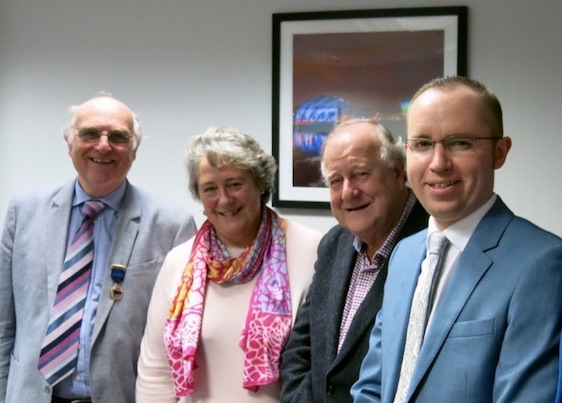
Iain Morgan, Jean McGowan, Douglas McGowan and Paul Semple at Jurys Inn, Glasgow, after Paul’s talk on 14 March 2018. Copyright CRSC
None of us has the slightest idea just how many hours they put in to realise their dream, the sacrifices they made and, no doubt, the setbacks they suffered. And let’s pay tribute, too, to their wives and families, who supported them all the way, at what cost we will never know. It is a great pleasure to see Douglas’s wife, Jean, here tonight — our thanks to her too. John Whittle, who also played a role in giving Waverley a future in private hands, had hoped to be with us too tonight but unfortunately had to call off due to ill health.
How many of us could have realistically believed that Waverley would still be sailing more than 40 years after that fateful moment, in the autumn of 1973, when she was withdrawn from service and everyone thought she was ‘Finished with Engines’?
Terry and Douglas were the pivotal figures behind her preservation. Without their efforts, our world would be confined to ferry hopping. Their initiative and dedication in the 1970s and beyond ensured that the ‘flame’ of the traditional Clyde paddle steamer was kept alive and lives on today, here in the west of Scotland and around the coasts of Britain, helping us as a Club to fulfil one of our stated aims — to sail together.
In short, these are two individuals whose contribution to our enjoyment of life should be formally celebrated. Conferring Honorary Membership on Douglas and Terry is not a ‘lifetime achievement’ award. They don’t need CRSC to validate their achievements. Honorary Membership is simply the best way, the only way available to us, as a group of fellow enthusiasts, to show our respect and gratitude.
Please join me in celebrating their inspiring achievements and thanking them for everything they have done to preserve Waverley — for our enjoyment, and for hundreds of thousands of others.
In a short and dignified response, Douglas McGowan thanked the Club and recalled the early struggles to secure Waverley’s future. He also read the following message from Terry Sylvester:
As I am unable to be with you all this evening I have asked Douglas, my friend of 49 years, to give you my most sincere thanks for your great kindness in granting me honorary life membership of the Clyde River Steamer Club, but I consider my award is really a tribute to so many.
Without the small number of key contributors in 1974, in particular John Whittle’s trust in us, the immense contribution of Captain David Neill and the vital roles played by Peter Reid, the late Ian Burrows, and George Train plus Douglas and me, the Waverley story would never have happened. But also the many contributions of countless others, including many of you, were vital and continue to be so.
Starting in the spring of 1975 without any established business, the key factor in Waverley surviving financially was achieved by using the ship to earn the vital income, and take advantage of all opportunities, that could make the operation of a paddle steamer viable.
I wish you all a most happy and enjoyable evening, and hope we will meet again in the coming summer.
Terry Sylvester
Here are some more of Paul Semple’s illustrations, all drawn from his photo collection:
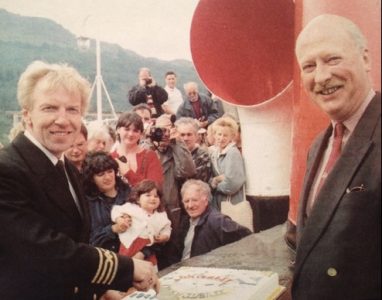
Waverley 50th birthday cake in 1997, with Captain Steve Michel and WEL General Manager David Duncanson
All photos on this website are copyrighted by their respective owners. All rights reserved. Unauthorised use is prohibited.
